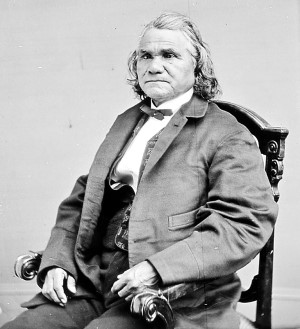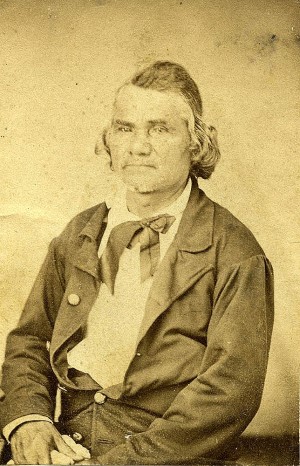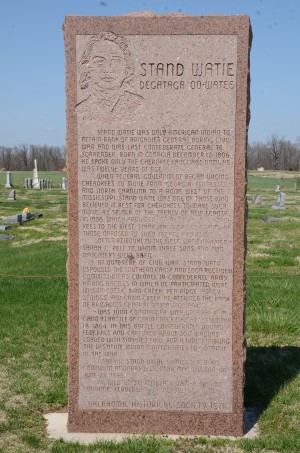Stand Watie
Best known as: Cherokee chief and Confederate general
Born: December 12, 1806 in Calhoun, Georgia
Died: September 9, 1871 Delaware County, Oklahoma
Resting place: Polson Cemetery, Delaware County, Oklahoma
Alternative names: Standhope Uwatie, Tawkertawker, Degataga, Isaac Uwatie
Biography:
The boy who would become Confederate General Stand Watie was born in 1806 as "Degataga," which means "standing firm" in Cherokee. His father, named Uwatie, which means "ancient one," was a full Cherokee, and his mother, Susanna Reese, was half Cherokee and half white. He had two brothers: Thomas and Gallagina, who later changed his name to Elias Boudinot. When Degataga was a child, his parents converted to Christianity. His father took the first name David, and he took the name Isaac. When he grew older, he preferred to go by Stand Uwatie, and later he dropped the "u," becoming Stand Watie.
David Watie owned a plantation in Cherokee Nation, in what is now Georgia. Degataga/Isaac and his siblings grew up speaking both Cherokee and English and attended a Christian school called the Moravian Mission School in Spring Place, Georgia. As a young adult, Stand Watie wrote for the Cherokee Phoenix, a newspaper that published in both Cherokee and English. His brother Elias was the editor of this newspaper. Additionally, Watie served as a clerk of the Cherokee Supreme Court and as Speaker of the Cherokee National Council.
Watie's personal life weas somewhat complicated. He married four times, to Eleanor Looney, Elizabeth Fields, Isabella Hicks, and Sarah Bell. He and his fourth wife, Sarah, had three sons named Saladin, Solon, and Cumiska, and two daughters named Minnee and Jacqueline.
In the late 1820s, gold was discovered on Cherokee lands, and the area was inundated with settlers. Conflict ensued, and in 1830 Congress passed the Indian Removal Act, which required that the Cherokee be relocated west of the Mississippi River. In 1832, the state of Georgia confiscated the Cherokee lands and destroyed the offices and printing press of the Phoenix. Watie believed that the best move was for the tribe to agree to the relocation but to secure their rights through a treaty. He, his brother Elias, their uncle Major Ridge, and their cousin John Ridge, signed the Treaty of New Echota in 1836 and moved to what is now Oklahoma. There, Watie founded a plantation near Honey Creek.
However, most Cherokee opposed relocation. The treaty was never ratified, and the signers were targeted for assassination for giving away tribal lands. In 1839, Elias Boudinot, Major Ridge, and John Ridge were attacked and killed. Watie was the only treaty signer to escape assassination. Violence among the Cherokee raged for years, with Watie and his supporters fighting against those loyal to chief John Ross. In 1842, Watie killed James Foreman, one of his uncle's assassins. He was acquitted of murder charges by reason of self-defense, and his nephew, who had become a lawyer, defended him. In 1845, supporters of Ross killed Watie's brother, Thomas.
When the Civil War broke out in 1861, a majority of Cherokee voted to support the Confederacy, primarily because they opposed the federal government's plan to create the state of Oklahoma out of their territory. Watie was commissioned a colonel in the Confederate Army on July 12, 1861 and organized a cavalry regiment which would become known as the 1st Cherokee Mounted Rifles. Watie quickly garnered acclaim for his performance at the Battle of Oak Hills in August, which secured the Confederacy's hold on Indian Territory. He and his regiment also participated in the battles of Chustenahlah and Elkhorn Tavern and successfully defended against a Union invasion of Arkansas. In March 1862, they took part in the Battle of Pea Ridge in March 1862, during which they captured Union artillery positions and covered the retreat of the rest of the Confederate forces.
In 1862 John Ross announced his support for the Union and fled east with many of his supporters. Watie was subsequently elected Principal Chief. He continued to lead his cavalry, fighting against Union troops as well as Creek and Seminole Indians and other Cherokee who sided with the Union. On May 10, 1864 he was promoted to brigadier general, a position that gave him command of the First Indian Brigade of the Army of the Trans-Mississippi, which consisted of two regiments of cavalry and three battalions of infantry. Watie and his brigade fought in numerous battles in the western theater, including in Indian Territory, Arkansas, Missouri, Kansas, and Texas. They successfully kept Union troops out of southern Indian Territory and northern Texas, as well as keeping them occupied so that they could not be sent as reinforcements back east. It is said that Watie's brigade participated in more battles west of the Mississippi than any other unit. On July 16, 1864 they captured the steamboat J.R. Williams, which was carrying 150 barrels of flour and 16,000 pounds of bacon. On September 19, 1864 they took part in the Second Battle of Cabin Creek, during which they captured a wagon train and took possession of approximately $1 million worth of wagons, mules, and supplies.
In February 1865, Watie was placed in charge of the Indian Division of Indian Territory. By that point, however, the war was winding down. Watie and his brigade surrendered on June 23, 1865 in Doaksville in what is now Oklahoma. He was the last Confederate general to do so.
After the war, tensions continued between pro-Union Cherokee, led by Ross, and pro-Confederate Cherokee, led by Watie. Ross's supporters had refused to recognize Watie's election as chief in 1862. Both sides sent delegates to Washington, D.C., with Watie's side advocating for the creation of a Southern Cherokee Nation. This did not come to fruition, however. Instead, the U.S. government recognized Ross as the rightful chief. In 1866, Ross signed a treaty with the federal government, which granted the Cherokee additional lands but also required them to free their slaves and to give the former slaves the same citizenship and land rights as tribe members. Watie went into exile in Choctaw Nation. When a new chief named Lewis Downing was elected in 1867, he returned home. There, he rebuilt his plantation (which had been burned to the ground by Union soldiers), invested in a variety of other business ventures, and collected Cherokee legends and lore. Watie died in 1871 and was buried in Ridge Cemetery, which is now known as Polson Cemetery, in present-day Oklahoma.
Personality:
Watie is said to have been brave and daring (source) and inspired loyalty in his soldiers (source).
Fun facts:
- Was the last Confederate general to surrender
- Was the only Native American general in the Civil War
- His name means "Standing Firm"
Quotes:
- "If I commit an error I do it without bad intention."
- "Sometimes I examine myself throughly and I will always come to the conclusion that I am not such a bad man at last as I am looked upon."
Pictures:

Watie in 1862

Watie as a colonel

Watie's marker in Polson Cemetery, Oklahoma (photo by Valis55, via Wikipedia)
